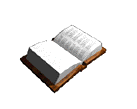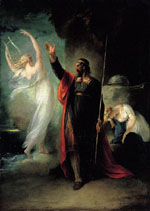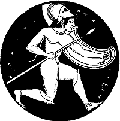Literary Interpretation
Welcome to the WMU English Department's enjoyable and intellectually engaging first course in literary study! While this class serves an introduction to a major or minor in English it also meets general education requirements for the Fine Arts Distribution Area 1. The course is described in the Undergraduate Catalog as:
An introduction to the study of literature, aimed at developing abilities to read literature and write about it with skill, sensitivity, and care. Students will read poetry, drama, and prose fiction, and through writing of several papers will be introduced to terms and methods of the formal study of literature.
My specific objectives for English 1100 are:
To increase enjoyment, interest, confidence, and skill in reading, discussing, and writing about literature.
To develop knowledge of the vocabulary of literary analysis and the genres of poetry, fiction, drama, and creative non-fiction.
To enhance ability to read with close attention 1) to language, form, and meaning, 2) to historical, cultural, social and political context, and 3) to one's own experience and perspective.
To develop familiarity with different scholarly practices and theoretical frameworks for reading literature.
To improve writing, especially analytical skills, logical reasoning, use of library sources, and ease, clarity, and gracefulness of expression.
I consider this section of Literary Interpretation "experimental" because as we undertake these objectives, we will also explore my research and publication interest in internet learning about literature. In this class we will experiment with a number of web-based resources including literary and cultural archives, blogs, hypertexting, and on-line virtual reality environments. Our class blogs are accessible from LitInterp.blogspot.com.
Our section is held in a wireless, laptop classroom in Wood Hall that I specifically designed as a "classroom of the future." Our on-line syllabus also serves as an electronic, hyperlinked, textbook. All students will develop and publish their own literary blogs and these websites will be interlinked, interactive, and woven into course discussion and writing.
I'd like to think that you are enrolled in one of the most intellectually interesting and cutting-edge courses in literary studies in the world!
I do not assume that students in this class have any special technology interest or expertise, and we will develop needed skills in class. Also WMU has a variety of resources to support the integration of technology into learning; you may find the IT Lab on the Tower Bridge of the second floor of the Computer Center especially helpful.
Because the course is held as a seminar, your participation is vital to the learning of your classmates. Attendance will be taken and missing classes will lower your grade and missing more than four classes may lead to failing. This course will follow WMU policies regarding academic honesty. This course also supports the Safe on Campus environment (387-2123).
The experimental nature of the course means that the syllabus is provisional. We may need to make modifications as the semester progresses.
My office is 723 Sprau Tower, 387-2605, and his office hours are Tuesday and Thursday immediately after class and at noon. I am very accessible by email. If at any point in the semester if you feel stress, English 1100 offers free on-line therapy from Eliza! (One of the early products of artificial intelligence research.)

Required:
The MLA Handbook for Writers of Research Papers, also available at The OWL at Purdue
Bedford Glossary of Literary Terms, also available at Bedford/St. Martin website
An Island Like You: Stories of the Barrio by Judith Ortiz Cofer
Extensive reading from on-line syllabus
Major Assignments
 |
Blog Assignments / Participation
(20%) Poetic Imagery Analysis (20%) Due: 9/26 Odyssey Comparative Translation Analysis (20%) Due: 10/10 Island Like You Project (20%) Due: 10/9 Shakespeare's Tempest Literary Analysis/Research Paper (20%) Due: 12/13 |
Sep 5 Tuesday: Introductions
Examine Allen's blog: Literary Interpretation at LitInterp.blogspot.com
Discuss: "My Papa's Waltz" by Theodore Roethke, "To His Coy Mistress" by Andrew Marvell, and The World is Too Much With Us, by William Wordsworth.
Create your blog at: Blogger.com, provide Allen with your blog address.
Sep 7 Thursday: Identifying Favorite Poetry
1. Read entire on-line syllabus and bring any questions to class.
2. Examine several different on-line poetry archives, find 2-3 favorite poems new to you, post a link to these poems on your blog and write 10-20 reasons why you really like one of these poems. Prepare to share with the class.
Some on-line poetry: Academy of American Poets, Poetry Archives, Bartleby.com, Project Gutenberg, American Verse Project, Library of Congress Poetry Resources, University of Toronto Poetry On-Line, Contemporary Poets, British and Irish Poetry, Poetry Magazine, Poetry House, Poetry Archive, University of Virginia Modern English Text Archive, and so many more, try Google !
Sep 12 Tuesday: Poetry as a Genre and Starting your Personal Anthology
1. Visit 3-4 classmate's blogs, linked from Allen's blog, LitInterp.blogspot.com, and comment on their postings.
2. Read about poetry as a genre at Wikipedia. Take notes on ideas that interest you and prepare to share those ideas in class.
3. Return to on-line poetry sources and continue your search for favorite poems. Add links to 3-4 more favorite poems and write many reasons about why you really, really like one of these poems. Prepare to share in class.
Sep 14 Thursday: Continue Poetry Love Fest 1. Visit 3-4 classmate's blogs, linked from Allen's blog, LitInterp.blogspot.com, and comment on their postings. |
 |
Sep 19 Tuesday: Complete Personal Anthologies, begin Poetry Imagery Paper
1. Visit 3-4 classmate's blogs, linked from Allen's blog, LitInterp.blogspot.com, and comment on their postings.
2. Your blog should have links to 20+ poems -- this is your Poetry Anthology!
3. Choose one poem that you would like to focus your a paper on about that poem's use of imagery. Get started on the paper by writing some ideas about the use of imagery on your blog.
Sep 21 Thursday: Writing About Poetic Imagery, Edit Rough Drafts
1. Visit 3-4 classmate's blogs, linked from Allen's blog, LitInterp.blogspot.com, and comment on their ideas for their imagery paper. Try to be sure that everyone gets some feedback.
2. Write a rough draft of your Poetic Imagery Analysis and bring to class. Will be checked off in the grade book!
Sep 26 Tuesday: Poetic Language and Translation: The Odyssey
1. Poetic Imagery Analysis Due
2. Closely Examine three different English translations of the first 34 lines of Homer's Odyssey.Odyssey Translations
Ancient Greek, with word-by-word transliteration into English at the Tufts University Perseus Archive.
1616: Chapman's Homer, first translation into English at Bartleby.com. (Keat's famous poem, "On First Looking into Chapman's Homer.")
1725: Alexander Pope translation in Project Gutenberg. (Scroll down to poem.)
1791: Cowper's translation in Bibliomania.
1879: Butcher-Lang translation in Robot Wisdom.com.
1900: Samuel Butler in MIT Internet Classics Archive.
1937: WHD Rouse at Amazon (Use "Search Inside")
1946: EV Rieu at Amazon ("Search Inside")
1961: Robert Fitzgerald at Amazon ("Search Inside")
1967: Richard Lattimore at Amazon ("Search Inside")
1980: Walter Shrewring at Amazon ("Search Inside")
1996: DW Myatt at Geocities.
1996: Robert Fagles at Amazon ("Search Inside")
2000: Lombardo and Murnaghan at Amazon ("Search Inside")
Sep 28 Thursday: Continued Odyssey Translation Comparisons
1. Post on your blog comments/analysis of 3-4 translations, with links.
2. Visit 3-4 classmate's blogs, linked from Allen's blog, LitInterp.blogspot.com, and comment on their postings.
Oct 3 Tuesday: Translate the Odyssey yourself!
1. Post on your blog your own translation of 10+ lines of the Odyssey. Choose a passage we have not studied in class, interpolate betweeen different English versions and the line-by-line Greek text. Indicate which texts were your "sources."
2. Visit 3-4 classmate's blogs, linked from Allen's blog, LitInterp.blogspot.com, and comment on their postings.
Oct 5 Thursday: Edit Rough Drafts Comparative Odyssey Translation Analysis
Bring rough draft of your paper to class.
Oct 10 Tuesday: War Poetry and Literature
1. Comparative Odyssey Translation Analysis Due
2. Read: "The War Prayer" by Mark Twain (1904); "Dulce et Decorum Est" by Wilfred Owen (1918), "Shooting an Elephant" by George Orwell (1936), "War Has Been Given a Bad Name" by Bertolt Brecht (1957), "The Things They Carried" by Tim O'Brian (1986) (handout).
3. Post comments on your blog about two or more of the readings and respond to several blogs of other students in class.
Oct 12 Thursday Our Country is at War!
1. Read poetry emerging from the current war(s) on going in the world. Respond on your blog. Some possible sites include: Poets Against War, War Poetry.co, War Prayer: Illustrated version, League of American Poets, Author's Den.
2. Post comments on your blog about two or more of the readings and respond to several blogs of other students in class.
Oct 17 Tuesday and Oct 19 Thursday Understanding the War
1. Find articles, literature, photographs, essays on the web that help you understand the current war in Iraq or Lebanon. Create links to these sites on your blog and comment on a few of them.
2. Respond to several blogs of other students in class.
Oct 24 Tuesday, Oct 26 Thursday, Oct 31 Tuesday, Nov 2 Thursday, Nov 7 Tuesday, Nov 9 Thursday Cultural Context Reading: An Island Like You
The fiction unit of the course is still underdevelopment in collaboration with Dr. Gwen Tarbox.
Nov 14 Tuesday Introduction to Literary Theory
Examine closely several websites introducing literary theory, such as that of Wikipedia, Kristi Siegal, Purdue, toolkit, and respond on your blog. You will want to have some ideas especially about New Criticism, Feminist Criticism, Marxist Criticsm, and Postcolonial Criticism.
Nov 16 Thursday
Visit blogs of classmates and continue the discussion about literary theory.
Nov 21 Tuesday Shakespeare's The Tempest
Nov 23 Thursday No Class, Thanksgiving Recess Nov 28 Tuesday Tempest On-Line in Art and Film
|
 |
Nov 30 Thursday Tempest Virtual World Visit, Exploring Theoretical Frames
Activity to be determined
Dec 5 Tuesday Library Scholarship on the Tempest
MLA Bibliography at WMU Library, Tempest as Art, Allen's Article
Dec 7 Thursday Rough Draft of Tempest Research Paper Due
Dec 11-15: Finals Week
Dec 13 Monday 8:00-10:00am Scheduled Final Exam
------------------------
Compare/Contrast Other Introductory Literature Courses

